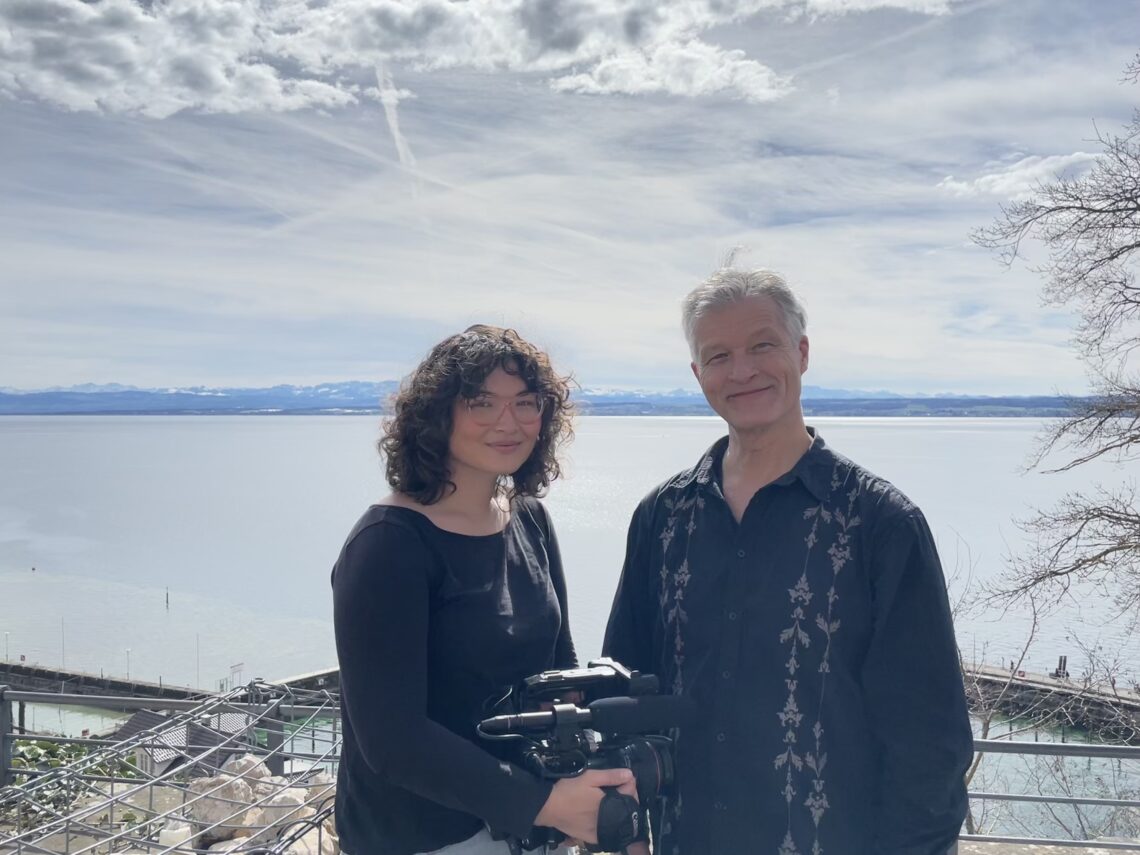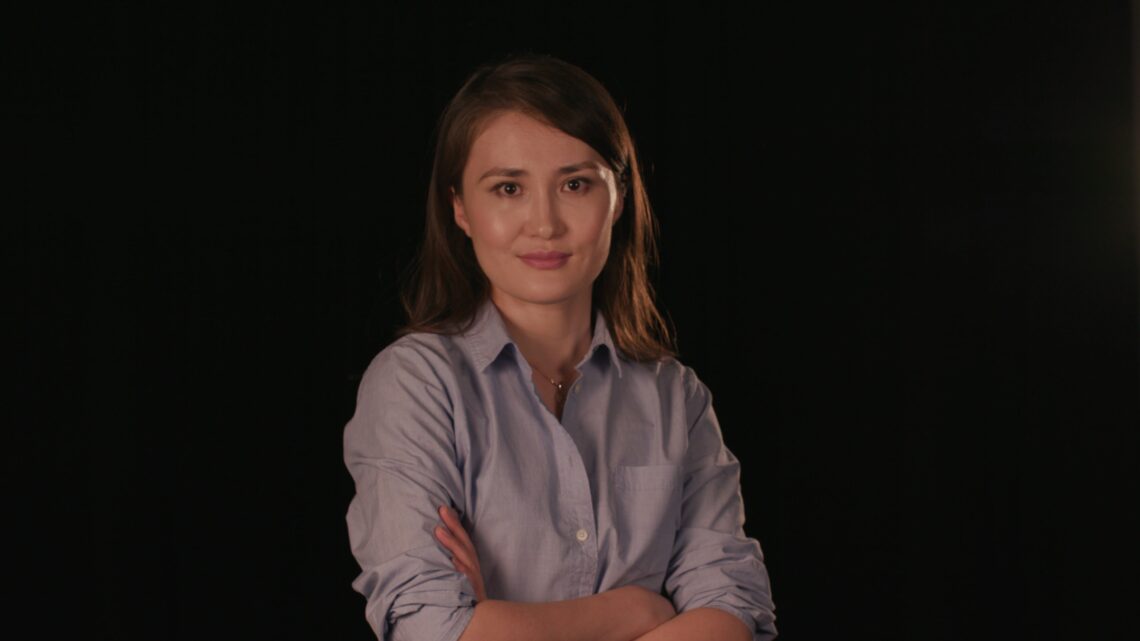The thesis films of two Class of 2023 graduates have been recognized as among the best in the world by the jury for the 50th Student Academy Awards.
MJ Johnson is among the seven documentary finalists and Meruyert “Mika” Shalbayeva was amongst 17 semifinalists by The Academy of Motion Picture Arts and Sciences.

MJ Johnson
Johnson, a visual journalist and filmmaker who was born and raised in Japan, produced and directed “God Bless The Family,” weaving together home movies and intimate conversations with family members to explore the personal costs of growing up in a Christian cult called “The Family.”
Her thesis advisers say the film “flips the cult documentary genre on its head.”
“There is an intimacy in every frame that comes from her carefully crafted camerawork and intuitive eye, which is strung together patiently, giving us the pace we need to take in the emotional weight of the material,” Professor Andrés Cediel and Continuing Lecturer Cassandra Herrman, co-teachers of short form video for 2022-2023, said in a joint statement. “It was a very brave film to make, and MJ’s vulnerability onscreen allows her audience to find some part of themselves, of their story, in hers, resulting in a film that is deeply moving and cathartic.”
Johnson said she’s been waiting to make this film her whole life. “This film is the story of my family, my survival and ultimately about healing, so I have always been searching for the right creative avenue to be able to express all of that,” she said. “I had to trust my instincts to tell it in a way that wouldn’t retraumatize myself or my family. I leaned on my friends and colleagues at school to provide emotional support and also sought out a therapist who helped me develop strategies to cope and compartmentalize the emotional labor it took to produce this film.”

MJ Johnson poses with her father, Jeffrey Johnson, who also appears in the film while on location in Konstanz, Germany in March 2023.
Geeta Anand, dean of Berkeley Journalism said she’s thrilled for both students. Johnson was part of the first cohort of the Dean’s Fellows program, a leadership development initiative that fully funds up to five first-generation college students as a way of removing structural barriers to entering journalism.
“It is wonderful and affirming to see the work of our students recognized as high quality, creative and important work,” Anand said. “I am so proud of the students, and so thrilled that our school can support them in producing such powerful work while they are here.”
An unseen perspective on the war in Ukraine
In a moment when there was so much coverage of the Russian invasion of Ukraine, Shalbayeva’s short film “Surfactant” gives us a very unexpected story about the war, from a previously unseen perspective, her thesis advisers explained.
“Mika got unique access to an award-winning dancer who chose to flee Russia, leaving his family and dance theater behind, to build a new life in Kazakhstan,” Cediel and Herrman said. “Through beautifully captured vérité footage and deeply intimate interviews, Mika charts Anton Shmakov’s personal reckoning with his country’s war of destruction, as he uses art to transform the pain of exile. The film culminates in a superbly edited, visceral dance performance, where Mika reveals Anton’s final message: When we allow ourselves to be truly free, we become a part of something greater, something that will not allow us to give in to hate.”

Meruyert Shalbayeva
Shalbayeva said that as a journalist and filmmaker, she couldn’t shy away from the war in Ukraine after watching its devastating effect on so many people. “I focused on Russians choosing to flee to other countries, including my homeland Kazakhstan, rather than to serve in a war they didn’t believe in,” she said.
The time difference between California and Kazakhstan is 13 hours, so when Shalbayeva received an email notifying her that she’d made it to the semifinals it was around midnight her time.
“I was completely stunned,” she said. “I thought it must be a mistake, but when I discovered it wasn’t, I couldn’t sleep, thinking that if the Academy jury shortlisted my picture for the finals, I must have some talent. And that feeling was amazing.”
A hat-tip to their mentors
Having “a space to freely create is precious,” Johnson said. “I wouldn’t have been able to make the same film being forced into other creative confines. I needed the space to fly, so my story could soar.”
Johnson said that without guidance, support and nurturing from thesis advisers Cediel and Herrman, “this film would not have evolved from a figment of my fragmented past into the tempered steel of emotional growth and healing that it ultimately became.”
Shalbayeva said what she appreciated the most about her “UC Berkeley family” is how everyone, from professor to students, was extremely passionate about visual storytelling.
She said she could not have made the film without Cediel, Herrman, Lecturer Mike Shen, technical advisers Chris O’Dea and Rick Johnson and her short-form video classmates. “These are people who were there for me in my darkest hour,” Shalbayeva said.
A history of recognition of films coming out of the J-School
This year’s recognition from The Academy follows a run of success for Berkeley Journalism’s student filmmakers. In 2021, Kristen Hwang’s thesis documentary “When They’re Gone,” about humanity’s fragile dependence on nature and the consequences of industrializing honey bees for crop pollination, won the top honor for student documentary filmmaking.
In 2020, Orion Rose Kelly and Pedro Cota’s thesis documentary “Na Luta Delas” (In Their Fight) — about growing violence against the LGBTQ+ community in Brazil — was named one of seven finalists. The prior year, Eva Rendle’s thesis film “All That Remains” won a bronze medal.
In 2018, the thesis films of four graduates — Grace Oyenubi, Lauren Schwartzman, Alan Toth and Nani Sahra Walker — accounted for three of seven finalist spots in the documentary category, a record for Berkeley Journalism. Schwartzman took home the bronze medal for the visually lyrical “Dust Rising,” exploring the vast power mere dust can have over everything from human health to the planet’s climate and the growing phenomenon of deadly dust storms in the American Southwest.
In 2017, Brad Bailey and Jason Hanasik were named finalists for Bailey’s “Hale,” and Hanasik’s “How to Make a Pearl.” Bailey went on to win the gold for documentary.
In 2016, producers Melina Tupa and Daphne Matziaraki were both nominated, and Matziaraki took home the top prize.
The awards ceremony will be held in October.
Help the next generation achieve accomplishments like these by making a tax-deductible donation to our Fine Cut Fund today.
